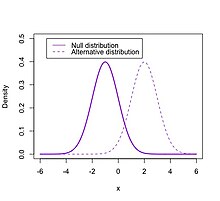虛無假說
外觀
此條目可參照英語維基百科相應條目來擴充。 (2024年5月29日) |

在推論統計學中,零假設(英語:Null hypothesis,又譯零假說,符號:)是做統計檢驗時的一類假說。
零假設的內容一般是希望能證明為錯誤的假設,與零假設相對的是對立假說,即希望通過證偽零假設而證明正確的另一種假說。從數學上來看,零假設和備擇假設的地位是相等的,但是在統計學的實際運用中,常常需要強調一類假設為應當或期望實現的假設,例如在相關性檢驗中,一般會取「兩者之間無關聯」作為零假設,而在獨立性檢驗中,一般會取「兩者之間非獨立」作為零假設。
如果一個統計檢驗的結果拒絕(reject)零假設(結論不支持零假設),而實際上真實的情況屬於零假設,那麼稱這個檢驗犯了型一錯誤。反之,如果檢驗結果支持零假設,而實際上真實的情況屬於備擇假設,那麼稱這個檢驗犯了型二錯誤。通常的做法是,在保持第一類錯誤出現的機會在某個特定水平上的時候(即顯著性差異值或α值),儘量減少第二類錯誤出現的概率。
相關條目
[編輯]參考來源
[編輯]延伸閱讀
[編輯]- Adèr, H. J.; Mellenbergh, G. J. & Hand, D. J. Advising on research methods: A consultant's companion. Huizen, The Netherlands: Johannes van Kessel Publishing. 2007. ISBN 90-79418-01-3.
- Efron, B. Large-Scale Simultaneous Hypothesis Testing. Journal of the American Statistical Association. 2004, 99 (465): 96. doi:10.1198/016214504000000089. The application of significance testing in this paper is an outlier. Tests to find a null hypothesis? Not trying to show significance, but to find interesting cases?
- Rice, William R.; Gaines, Steven D. 'Heads I win, tails you lose': testing directional alternative hypotheses in ecological and evolutionary research. TREE. June 1994, 9 (6): 235–237. doi:10.1016/0169-5347(94)90258-5. Directed tests combine the attributes of one-tailed and two-tailed tests. "...directed tests should be used in virtually all applications where one-sided tests have previously been used, excepting those cases where the data can only deviate from H0, in one direction."


